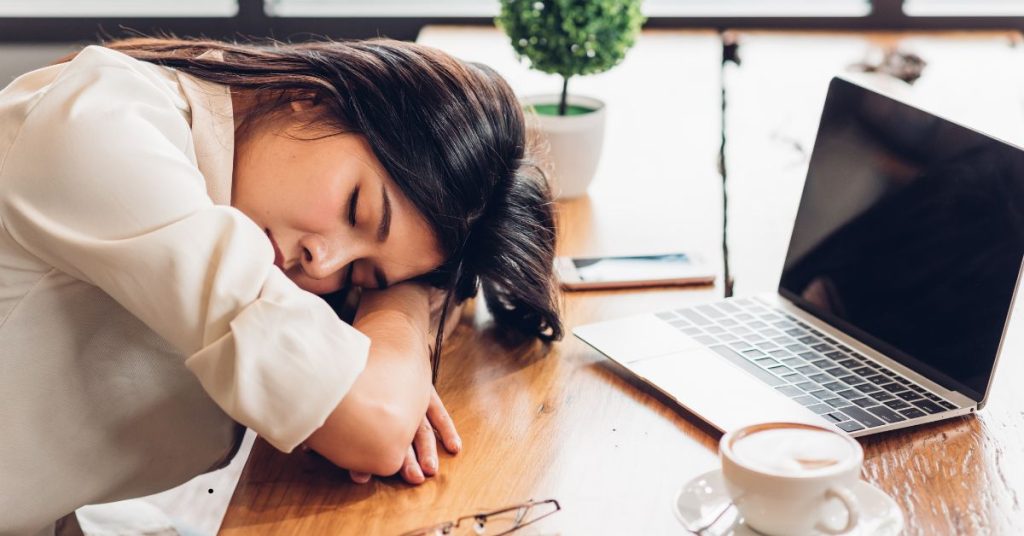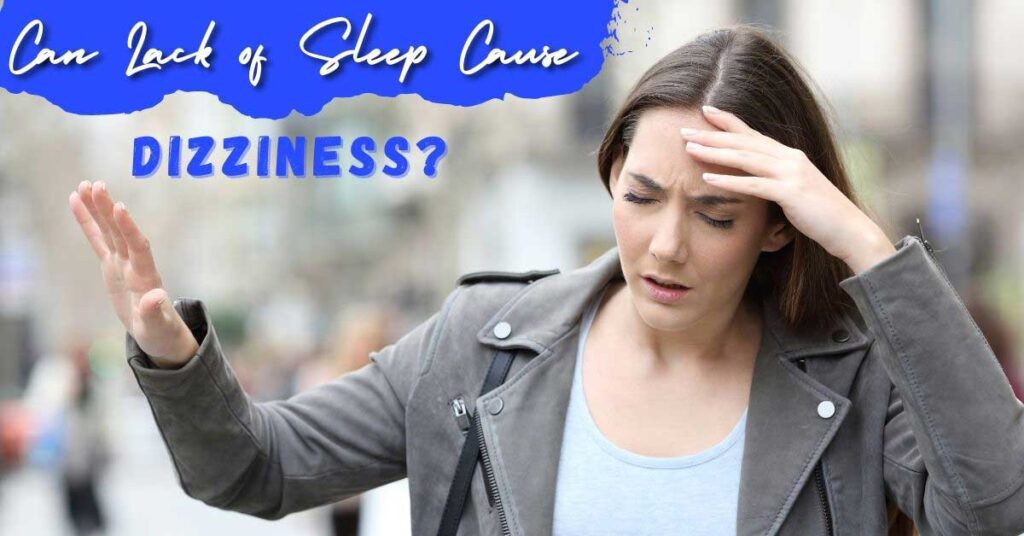Dizziness is often frightening, but it’s not something that you immediately think of as a sign of sleep insufficiency. In this post, however, I’ll discuss several of how can lack of sleep cause dizziness. More importantly, how to deal with this particular sign.
Sleep is crucial to keep your health in good shape. Sleep helps you conserve energy. When you sleep, your body’s functions are at a lower rate to maintain your metabolism. This means that you’ll have more energy to tackle the next day.
What Causes Poor Sleep To Cause Dizziness?
Table of Contents
If you think of dizziness, chances are that you’ll associate the issue more with conditions like low blood pressure, dehydration, or anemia. A poor night’s sleep isn’t always the first thing that pops into your mind, but there are several clever ways that a stormy night’s rest can trigger this condition; some are explicit, and others less so. Let’s examine some of them!
Results of Lack of Sleep
1. Sleeping In The Wrong Place Can Lead To Fatigue
It’s not a surprise that lack of sleep is connected to low energy levels. According to the Great British Sleep Survey, 88% of people who sleep poorly suffer from fatigue, compared to only 29% of people who get good sleep.
So, apart from depleting your energy levels throughout the day, why is fatigue related to dizziness? It is believed that fatigue is connected with a variety of signs which could cause dizziness. These include blurred vision, low-concentration headaches, poor coordination, and weak muscles.
2. Remain Tired All the Time
A healthy individual’s primary indication of sleep deprivation is constantly feeling exhausted. Sleeping requires a lower level of bodily activity. Heavy eyelids are the primary indication of sleep lack. Sleep deprivation causes cognitive impairment and the fatal risk of falling asleep while in a dangerous circumstance, such as behind the driving vehicle.
3. Poor Balance and Coordination
A lack of sleep can cause similar effects on motor control as alcohol-related intoxication. If you’re sleeping less, you can stumble and suffer from poor coordination and balance.
You’re more likely to fall, have physical injuries, and have accidents. It could also mean that you are slower in your reaction speed.
4. Problems with Concentration and Memory
While asleep, your brain develops new neural pathways that allow you to absorb and process the information you learn. If you’re not getting enough sleep, the brain fails to create these pathways, making it harder to concentrate, focus, and retain the information you’ve learned. Lack of sleep can impact both your long-term and short-term memory and hinder your ability to finish tasks efficiently.
5. Low Sexual Libido
Sex hormones such as testosterone and estrogen can fluctuate and become out of balance when you’re not getting enough sleep. This could result in low sexual desire and libido and also issues with fertility and erectile dysfunction.
6. High Blood Pressure
Can Lack of Sleep Cause Dizziness? People who suffer from insomnia or sleep deprivation are more likely to suffer from hypertension. Sleep deprivation can increase your body’s ability to produce a stress hormone known as cortical, which contributes to elevated blood pressure.
Obstructive sleep apnea is a different sleep disorder that can increase blood pressure. This condition can cause blood oxygen levels to decrease and put stress on the cardiovascular system.
Consult a doctor right away if you are suffering from one of the sleep disorders that lead to high pressure. A high blood pressure level increases the risk of stroke, heart attack, or other cardiovascular diseases.
7. Your Emotions Are All Over the Place
You might feel like your emotions are in overdrive because you’ve been sleeping less. Things that typically weren’t likely to cause you stress previously a tear-jerking flick or a big deadline at work may trigger stress, sadness or even anger. (It can also be in the opposite direction: “People can get slap-happy and giddy as well,” she explained.)
8. You Get Sick Often
Your body’s immune system can also be affected by poor sleep. In particular, fighting off colds is more complicated. A study from 2015 of Sleep monitored 164 healthy males and women for seven days. 11 Participants were treated in quarantine, receiving nasal drops containing rhinovirus, and then monitored for five days to determine the severity of a cold. The study revealed that a longer sleep time was linked to a higher vulnerability to the common cold.
When you’re asleep your immune system makes Cytokines, proteins that help fight inflammation and infections. Researchers have speculated that a few nights of inadequate sleep might reduce your body’s production of cytokines, weakening your protection against viruses.
9. You Have Trouble Seeing
When fatigued, you’re not able to control the muscles of the eye as well (as you usually do).
The first thing to note is that skipping sleep removes the ciliary muscle that aids in focusing your eyes. As a result, you’ll be unable to focus when studying close up, as he explained.
10. Heart Problems as a result of Sleep Deprivation
Although it’s not entirely sure why sleeping less causes such harm to the heart, scientists recognize that it disrupts essential health functions and biological processes such as blood pressure, glucose metabolism and inflammation. The risk of developing cardiovascular heart disease and coronary heart disease increases when people do not get enough rest, regardless of whether the person is young or healthy.
11. Incapable Of Concentrating
People who don’t have enough time to rest are incredibly restless. Attention spans can diminish dramatically because you are unable to concentrate on one thing at the same time. Additionally, you may have insomnia, which could cause your condition to get worse.
12. Dry Skin
The speed at which wrinkles appear increases if he is not sleeping enough. The body requires this time to regenerate and repair, affecting the face’s appearance.
It is dry or easily wrinkled. If you’re developing signs of premature aging, like a loss of collagen and elastin, you should sleep more.
13. Can Make You Feel Miserable
After a long night of no sleep, everybody feels miserable. Whatever the reason for the night of no sleep and the following day is painful for everyone who’s experienced sleeplessness.
14. Cause Nightmares
This is one of the many symptoms that can result from poor sleep during the night. If you’re not getting enough sleep at night, it can disrupt the sleep-related (Rapid Eye Movement) state while you sleep, which means you’ll be entering deep sleep phases such as Light Sleep (Stage 1), Slow-Wave sleep (Stage 2) as well as Rapid Eye Movement (REM) more quickly than usual. This can cause night terrors or nightmares for some people.
15. Cause Headaches
Can Lack of Sleep Cause Dizziness? A restful night’s sleep helps keep our bodies healthy and happy and, for those who suffer from headaches, it’s crucial. Unbalanced sleep patterns can cause headaches in certain people, and shifts in sleep patterns can cause migraines for some.
How Much Rest Is Enough?
The requirements for sleep vary between individuals and the next based on their age, physical level of activity and general health, as well as other personal aspects. In general:
- Primary school children require around 9 to 10 hours of sleep. Research has shown that increasing the amount of sleep your child gets to as little as one hour can drastically enhance their school performance.
- Teenagers need between 9-10 hours of sleep. Teenagers are more likely to have a higher need for sleep at a time when peer pressure and social pressure can result in a reduction in the amount of sleep they get.
- Adults require around eight hours of sleep, based on their circumstances. We are more likely to require more sleep when we get older however, take your time and consider your personal level of alertness. If you are tired throughout the day, you should try to sleep more.
Sleeping Tips
Tips on how to improve your sleep include:
- Make it a point to get up earlier every night.
- Do not smoke or drink alcohol or caffeinated drinks in the hours before the time you go to bed.
- Enhance your sleeping space by any means you can. For example, make sure it is dark and quiet, switch off the lights and put on headphones if you live with noisy neighbours.
- Stay away from distractions in your bedroom, like a TV or computer.
- Relaxation techniques can assist you in falling asleep quickly.
- Find professional help to treat sleep disorders like snoring.
- Go through The Better Health Channel fact sheets on sleep to discover ways to improve your sleeping habits for you and your child.
How Much Sleep Do I Need?
There is no standard regarding how much rest you should get every night, as each person is unique.
- On average, an adult’s “normal” amount of sleep is thought to be seven to nine hours per night. Baby and toddlers can be sleeping longer than this, while older adults could be sleeping less.
- The most important thing is to think you’re sleeping enough and whether your sleep quality is satisfactory.
- Likely, you need to sleep more when you feel exhausted all day long, impacting your daily life.
Sleep Deprivation Treatment
The most simple and straightforward solution to insomnia is getting more sleep. No matter if it’s a chronic or acute health issue; a healthy night’s sleep can enable a person to recover quickly.
Beating anxiety, eating a nutritious and healthy diet, and not drinking alcohol are a few other things to consider to ensure a restful night’s sleep. Certain medications may also disrupt sleep so seek advice from a medical professional regarding the similar. Engaging in an activity like walking, jogging or swimming can help you sleep more comfortably.
Do not use electronic devices at night as they may affect sleep. Being in the sun, Yoga, meditation and breathing exercises can aid in sleeping better at night. Treatment of the root cause of the problem that may cause insomnia can also aid in sleeping better and prevent sleep loss.

Frequently Ask Questions
Do Sleeping Pills Aid In Sleeping?
If the behavioral approaches don’t work, then over-the-counter sleep aids like melatonin could be somewhat safe alternatives. However, any sleeping aid (over-the-counter or prescribed) is best used on the advice of a doctor. Avoid taking sleeping pills longer than two or three weeks. Even in short-term use, these medications must be managed with care.
Can Lack of Sleep Cause Dizziness?
Nearly everyone has experienced the feeling of being sluggish after an unrequited or sleeping in a slumber. Even after one night of not enough sleep, it is possible to feel tired throughout the day, with slow thinking, a lack of energy and a mood of anger.
Do You Think That Lack Of Sleep Can Make You Feel Sluggish?
Your balance is often off-balance. A lack of sleep can impact your coordination and balance and make you more prone to falling. If you’re not feeling well or perhaps due to fatigue or low testosterone, those who are sleep-deprived often have low sex drives.
Can Sleep Deprivation Trigger A Seizure?
Yes, it is possible. The seizures are extremely sensitive to the patterns of sleep. Certain people experience their first and only seizure following an “all-nighter” at college or after sleeping poorly for an extended time.
Conclusion
While it may not appear to be, sleep is essential to your daily routine. This is because your body requires sleep to enable a myriad of vital tasks to be accomplished.
I hope you got Can Lack of Sleep Cause Dizziness? Dizziness and lightheadedness are just two of the signs of sleep lack. Other signs include headaches and lack of concentration. To avoid these signs, check out our guidelines for the recommended amount of sleep you must get.


